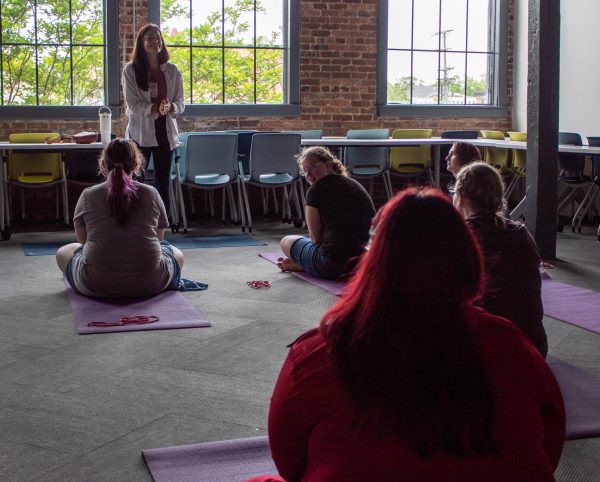An interview with my grandfather
January 30, 2020
It seems to be a constant, this mistreatment of man. In each of my twenty-one years of age I have endured it, as did my father before me and his. Ollie Hatchett Sr., my grandfather, most assuredly recieved the most concentrated dose of this institutionalized torture we call racism. Hatchett was born in 1939, a year most notably marked the beginning of World War II. By the time he was in high school the country was still bound by its past ignorances, including an affinity toward the fairer skinned.
“I feel like I had a calling from God to preach,” Hatchett said. “It was just that urge that I needed to do something for people, to help people and their spiritual walk.”
Hatchett began preaching in 1971, but his life before then was mottled with the markers history had set in time. In 1957, his senior year, the Civil Rights Movement was on its way to the success that society knows it to have been.
“Some of the teachers from school would pick up students and take them to [Woolworths] lunch counters [downtown] and they would do sit-ins,” Hatchett said. “That’s how it all started.”
Hatchett’s high school, Councill Training School was brimming with students. Its halls filled seemingly moments after the chime of each bell. Binford Toney, another student at that time, recalls this:
“It was a lot of students there, I tell you … that was our school,” Toney said.
When Toney said “our” school, he meant blacks. It was the only black school in Madison County and it was packed. Binford and his wife Louise Toney attended Councill Training with Ollie, Binford graduating in ‘59 and Louise in 57’.
“Triana, Gurley, Toney … all different areas were bussed to Councill Training,” Louise said.
Though half a century has passed, the Toneys still have fond memories from what they claim to still have been “the good old days”. They even remember their classmate in these formative years.
“[Ollie] was real intelligent,” Binford said. “He didn’t hardly leave an ‘i’ un-dotted or a ‘t’ not crossed the way he spoke. He stepped around with his books like he was a professor … he was about his business.”
Hatchett had graduated as salutatorian years before. Second place was not his best, but the trend of the time made the prospect of higher education both null and void.
“I was the second smartest one, Florida Goods was the first.” Ollie said. “Most students thought, when they got a high school education, that was enough. [I] didn’t have anybody to encourage [me to go further.]”
Instead of springboarding off of high school into a college education, Hatchett spent a year in Nashville with a relative, a destination so new and foreign to him that it might as well have been Mars. Though when he returned it seemed that he had touched down upon Venus, for he found love shortly after.
“I had a friend up in Toney, Matt Tibbs. He was telling me he was coming down to see his girlfriend [and] he wanted me to come and go with him,” Hatchett said. “His girlfriend wasn’t at home … she was at Cleotha’s house.”
Cleotha is Ollie’s now wife of fifty-eight years. After this chance encounter they hit it off.
“She was the prettiest thing I’d ever seen,” Ollie said.
From then on, Ollie and Cleotha were inseparable. They dated a mere eight months before they wed.
“He would come to see me every Wednesday, Saturday, and Sunday,” Cleotha said. “Then we got married.
In 1971, Ollie began preaching. After four years of rising through the ranks, he earned the title of pastor.
“If I were to start all over again, I would go like Paul did. He went to Arabia and studied for two years … after he had the Damascus road experience.” Ollie said.” But I think every period — whatever the times may be — sometimes requires more [of us]. We are to be prepared for whatever that period requires of us. The age we are living in now requires for a young man to do much more than we did.”
40 years pass, easily within the well-laid tracks of work and kids and tending to the flock. Naturally after serving for that long, one would be appointed to a higher position. For Ollie this title, presiding elder, was renewed for eleven years in a row.
“On the weekend I would drive at least 300 miles,” Ollie said. “… sometimes going to sleep [and] running off on that side of the highway, [oftentimes] stopping at Hardee’s gettin’ me a cup of coffee to try to stay woke, but I was still goin’.”
Staring forward, the most recent events of his life seemed to weigh on him, but not noticeably. The sudden death of his youngest and a minor stroke have taken him by storm, but he has weathered plenty before. The movement is slight … a sudden drop in his gaze. He reverts back into my grandfather then, imparting these words:
“That’s what we’re here for, it’s to help somebody. Not to talk about them or try to bring ‘em down, but to try to help somebody … to try to help them be better.”










